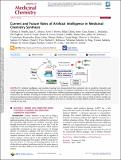Current and Future Roles of Artificial Intelligence in Medicinal Chemistry Synthesis
Author(s)
Struble, Thomas J; Jaakkola, Tommi S; Green Jr, William H; Barzilay, Regina
DownloadPublished version (2.095Mb)
Publisher with Creative Commons License
Publisher with Creative Commons License
Creative Commons Attribution
Terms of use
Metadata
Show full item recordAbstract
Artificial intelligence and machine learning have demonstrated their potential role in predictive chemistry and synthetic planning of small molecules; there are at least a few reports of companies employing in silico synthetic planning into their overall approach to accessing target molecules. A data-driven synthesis planning program is one component being developed and evaluated by the Machine Learning for Pharmaceutical Discovery and Synthesis (MLPDS) consortium, comprising MIT and 13 chemical and pharmaceutical company members. Together, we wrote this perspective to share how we think predictive models can be integrated into medicinal chemistry synthesis workflows, how they are currently used within MLPDS member companies, and the outlook for this field.
Date issued
2020-04Department
Massachusetts Institute of Technology. Department of Chemical Engineering; Massachusetts Institute of Technology. Department of Electrical Engineering and Computer Science; Massachusetts Institute of Technology. Computer Science and Artificial Intelligence LaboratoryJournal
Journal of Medicinal Chemistry
Publisher
American Chemical Society (ACS)
Citation
Struble, Thomas J. et al. “Current and Future Roles of Artificial Intelligence in Medicinal Chemistry Synthesis” Journal of Medicinal Chemistry, "Artificial Intelligence in Drug Discovery" Special issue, 2020, © 2020 The Author(s)
Version: Final published version
ISSN
1520-4804
0022-2623